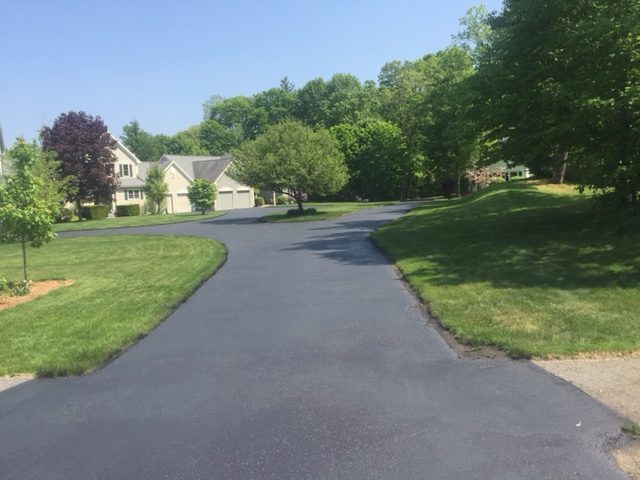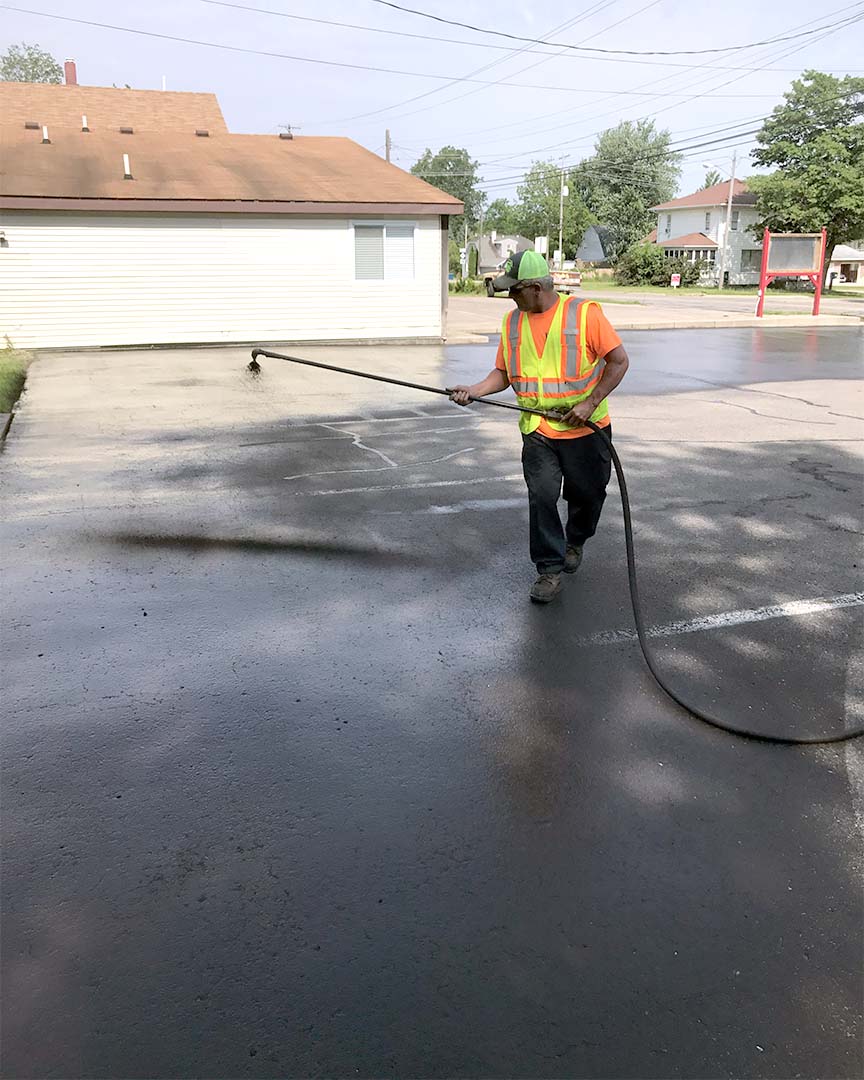Boost Commercial Appeal: Warm Mix Asphalt Sealing for Angled Parking Lots
Boost Commercial Appeal: Warm Mix Asphalt Sealing for Angled Parking Lots
Blog Article
Warm Mix Asphalt: A Sustainable Service for Pavement
Hot Mix Asphalt (HMA) has actually arised as a leading sustainable choice for pavement services, offering a myriad of ecological benefits and ingenious technologies. Its capacity to reduce and recycle materials power consumption presents an engaging case for its fostering in road building and construction tasks. Moreover, the long-term performance and toughness of HMA make it a favored alternative for infrastructure advancement. As the need for green building and construction techniques grows, checking out the subtleties of HMA's sustainability can supply valuable insights right into the future of sidewalk solutions.
Ecological Benefits of Warm Mix Asphalt

Moreover, Warm Mix Asphalt assists to reduce metropolitan warm island effects. Its dark shade takes in sunshine, decreasing the amount of heat mirrored back right into the environment contrasted to lighter-colored pavements. This can decrease ambient temperatures in urban areas, reducing the need for a/c and inevitably minimizing energy consumption.
On top of that, Hot Mix Asphalt adds to improved stormwater management. Its porous nature enables water to infiltrate the pavement and reenergize groundwater products, decreasing runoff and the risk of flooding. These ecological benefits make Warm Mix Asphalt a sustainable selection for leading highways and roads.
Energy Performance in HMA Manufacturing
Is power effectiveness a crucial aspect in the production of Warm Mix Asphalt (HMA)? Power plays a considerable role in the production of HMA, influencing both price and environmental sustainability. One vital aspect of energy effectiveness in HMA production is the usage of warm mix asphalt (WMA) innovations.
Additionally, advancements in plant technologies have actually caused more energy-efficient HMA production processes. Modern plants are made with attributes like recycled asphalt sidewalk (RAP) processing capabilities, reliable burner systems, and boosted insulation, all adding to energy savings. By optimizing power usage in HMA production, the industry can reduce its carbon footprint while keeping top notch pavement products. Energy performance is, for that reason, an essential consideration in ensuring the sustainability of Hot Mix Asphalt manufacturing.
Recyclability of Warm Mix Asphalt
The recyclability of Hot Mix Asphalt (HMA) is a pivotal aspect of its sustainability and long-term environmental impact. HMA is among one of the most recycled materials in the USA, with over 100 million heaps of reclaimed asphalt sidewalk (RAP) being recycled yearly in new sidewalk building and construction. Recycling HMA offers a number of environmental benefits, such as decreasing the need for virgin materials, decreasing energy usage throughout manufacturing, and reducing the quantity of waste sent out to land fills.
The procedure of recycling HMA entails grating the existing sidewalk, crushing it right into smaller pieces, and mixing it with brand-new accumulation and asphalt binder to create a recycled mix. This recycled mix can commonly do along with and even much better than conventional HMA, while requiring less resources and creating lower greenhouse gas emissions. By integrating RAP into brand-new sidewalk projects, roadway agencies can conserve natural sources, reduce prices, and lessen the ecological impact of roadway construction and upkeep tasks. Overall, the recyclability of HMA plays a substantial role in promoting lasting practices within the pavement market.

Long-Term Performance of HMA
Asphalt sidewalks demonstrate Your Domain Name toughness and strength over an extensive period, mirroring the lasting performance of Hot Mix Asphalt (HMA) The durability of HMA can be connected to its ability to endure rush hour lots, severe weather, and the results of aging. Researches have actually shown that properly designed and effectively constructed HMA sidewalks can last for 20 years or even more with regular upkeep. The key to optimizing the long-lasting efficiency of HMA hinges on making use of high-grade materials, following ideal techniques in building, and implementing effective maintenance methods. Correct drain, routine inspections, and timely repair services are crucial for maintaining the structural stability of HMA sidewalks with time. In addition, advancements in HMA modern technology, such as using polymer-modified binders and warm mix asphalt, have actually additionally enhanced the resilience and durability of HMA pavements. By prioritizing top quality building and construction and maintenance methods, HMA remains to show itself as a lasting and economical solution for durable pavement framework.

HMA: Longevity and Sustainability
Showing both longevity and sustainability, Hot Mix Asphalt (HMA) has become a keystone in the building and construction of resilient pavement frameworks - hot mix asphalt. HMA's toughness stems from its ability to hold up against hefty tons, severe weather problems, and high web traffic quantities, making it a reputable choice for roads, freeways, and flight terminal paths. The structure of HMA, which commonly includes accumulations, binder, and filler, plays an essential function in boosting its durability and resistance Home Page to tear and wear
Additionally, HMA's sustainability hinges on its recyclability and energy-efficient production process. The ability to reuse redeemed asphalt sidewalk (RAP) in new HMA blends lowers the demand for virgin materials and minimizes the environmental effect of sidewalk building and construction and maintenance. Additionally, the energy effectiveness of generating HMA exists in its reduced blending temperatures compared to other sidewalk products, bring about reduced energy consumption and greenhouse gas discharges.
Verdict
To conclude, hot mix asphalt (HMA) offers a sustainable service for sidewalk with its eco-friendly qualities. HMA's recyclability, power efficiency in manufacturing, and long-lasting longevity make it an environment-friendly choice for roadway building and construction. By conserving natural resources, decreasing waste, and reducing greenhouse gas exhausts, HMA plays a critical duty in advertising sustainability in facilities advancement. Its ability to minimize metropolitan heat island effects further emphasizes its relevance in developing environmentally aware and durable pavement systems.
HMA is one of the most recycled materials in the United States, with over 100 million bunches of redeemed asphalt pavement (RAP) being recycled yearly in brand-new pavement construction.The procedure of recycling HMA entails grating the existing sidewalk, crushing it into smaller sized items, and mixing go to my blog it with new accumulation and asphalt binder to create a recycled mix.Asphalt sidewalks show durability and durability over a prolonged duration, mirroring the long-term efficiency of Warm Mix Asphalt (HMA) In addition, innovations in HMA modern technology, such as the usage of polymer-modified binders and cozy mix asphalt, have even more improved the toughness and long life of HMA sidewalks. The capacity to reuse recovered asphalt pavement (RAP) in brand-new HMA mixtures minimizes the need for virgin products and reduces the ecological impact of sidewalk construction and maintenance.
Report this page